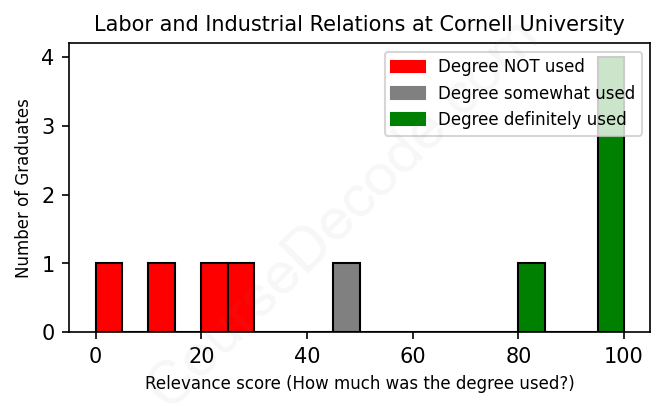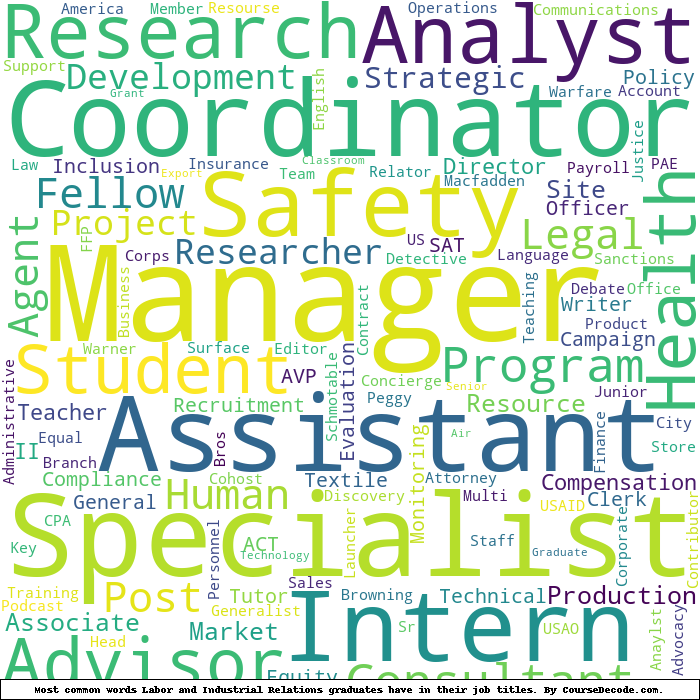
First, some facts. Of the Labor and Industrial Relations graduates from Cornell University we've analyzed , here's how many have used (or NOT used) their degree in their career:

These are estimates based on AI analysis of 10 LinkedIn profiles (see below).
The verdict? Below average. Overall, with an average relevance score of 59%, Labor and Industrial Relations graduates from Cornell University have a lower likelihood (-8%) of finding work in this field compared to the average graduate across all fields:
And for comparison, here's the chart for all profiles we've looked at across all degrees.
Also, after graduating, 50% of these graduates have pursued further education other than another Bachelor's degree (such as a Masters degree or other), compared to the average across all profiles of 35%. This suggests you may need more than just a Bachelors degree to be competitive as a Labor and Industrial Relations graduate.
See the details:
|
Relevance score: 100% We think this person has gone into a career highly relevant to their degree. We think this person has gone into a career highly relevant to their degree.
DEGREE INFOGraduated in 2021 from Cornell University with a Bachelor of Science - BS in Labor and Industrial Relations. Also pursued further education since (see below). JOB HISTORY SINCE GRADUATIONPeggy Browning Fellow, Legal Intern Make the Road New York Jun 2022 - Aug 2022 Equal Justice America Fellow, Legal Intern  Legal Aid Chicago May 2023 - Aug 2023 FURTHER DEGREES DONE SINCE GRADUATINGDoctor of Law - JDCornell Law School 2021 - 2024 ABOUTNo information provided. |
The top 10 most common jobs done by the graduates we've analyzed (ranked most common to least) are:
Based on the analysis of LinkedIn profiles of Cornell University graduates with a degree in Labor and Industrial Relations, it seems like a mixed bag when it comes to their job relevance. A noticeable number of them took roles that drift away from the core elements of Labor and Industrial Relations, such as project assistants, consultants, and roles in media production. Jobs like being a SAT/ACT tutor or a real estate agent might utilize general skills like communication or project management but don’t directly apply the specialized knowledge from their degree. It’s somewhat common to see positions that, while interesting and valuable, aren’t aligned with their academic background.
However, there are also some standout positions that are closely related to Labor and Industrial Relations. For example, roles like Human Resources Consultant, Policy Analyst at USAID, and various positions in labor advocacy emphasize the application of labor relations knowledge. Many graduates found themselves in impactful positions in organizations focused on labor rights, compliance, and policy, aligning neatly with their educational training. Overall, while many graduates seem to have ventured into less related fields, there definitely remains a solid portion of them making significant contributions within the realms of Labor and Industrial Relations.
Here is a visual representation of the most common words in job titles for Labor and Industrial Relations graduates (this is across all Labor and Industrial Relations graduates we've analyzed, not just those who went to Cornell University):

It seems like graduates from the Labor and Industrial Relations program at Cornell University have had quite a range of career paths, and many of them are definitely finding relevant jobs in their field. For those who graduated in the last few years, their first jobs often relate to roles like project assistance, research positions, or even teaching jobs. These early careers indicate a focus on practical application of their studies in labor relations, often stepping into roles that involve analysis, research, and compliance, which aligns well with their degree. It's also interesting to note that a number of graduates are finding roles in significant organizations like the U.S. Department of the Treasury and USAID, which suggests that employers value their expertise in labor and industrial relations, especially in areas like policy analysis and compliance.
Fast forward five to ten years after graduation, and many of these individuals are moving into more specialized or managerial roles. For instance, some have progressed to become technical specialists and policy analysts at prominent government agencies, while others have taken on leadership positions in non-profits focusing on labor rights and education. It highlights that not only are they starting in relevant roles, but they’re also advancing in their careers and taking on responsibilities that leverage their education. Although there are a few degrees of separation, like working in real estate or production roles, the trend still leans towards meaningful employment related to labor relations, indicating that these graduates are generally carving out solid pathways in their careers.
So, here’s the deal – earning a Bachelor’s degree in Labor and Industrial Relations at Cornell can definitely be challenging, but it’s not off the charts crazy hard either. Cornell's program is pretty rigorous, filled with foundational courses in economics, sociology, and HR principles, so you'll need to keep up with a fair amount of reading and assignments. If you're someone who enjoys diving into topics about work relationships, labor laws, and what makes workplaces tick, you might find it engaging. It’s definitely more demanding than, say, a generic liberal arts degree, but if you’re passionate about the subject, it can feel more rewarding than grueling. Just be ready to put in the effort, and you'll likely come out with a solid understanding of the field!
Most commonly, in the LinkedIn profiles we've looked at, it takes people 4 years to finish a Bachelor degree in Labor and Industrial Relations.
So, looking through the job histories of these Cornell grads, it kind of seems like they’re on the right path toward making decent money, especially considering they graduated from a solid school like Cornell. The first grad started off with a bunch of short gigs, which isn't unusual for recent alums, but they’ve moved up to positions at TD and UFCW, which likely pay well. The Navy grad probably banked good money during their service, especially as a Surface Warfare Officer. The USAID folks seem to have gone through some cool roles that probably pay decent salaries as they advance. The others have varied experiences, with some moving into teaching and nonprofit roles, which can be less lucrative at first but can lead to better-paying positions down the line. Overall, while they might not be rolling in dough just yet, they seem to be building strong careers that can definitely lead to solid salaries!
Here is a visual representation of the most common words seen in the "about" section of LinkedIn profiles who have a Bachelor degree in Labor and Industrial Relations (this is across all Labor and Industrial Relations graduates we've analyzed, not just those who went to Cornell University). This may or may not be useful:

Here are all colleges offering a Bachelor degree in Labor and Industrial Relations (ordered by the average relevance score of their Labor and Industrial Relations graduates, best to worst) where we have analyzed at least 10 of their graduates:
| College | Score | Count |
|---|---|---|
 Cornell University Cornell University
|
59 | 10 |